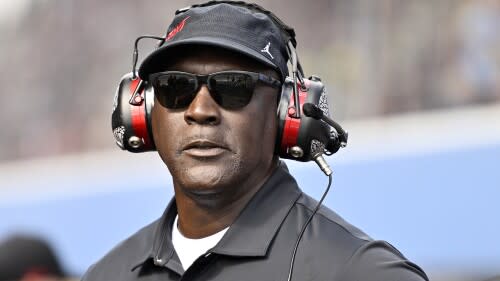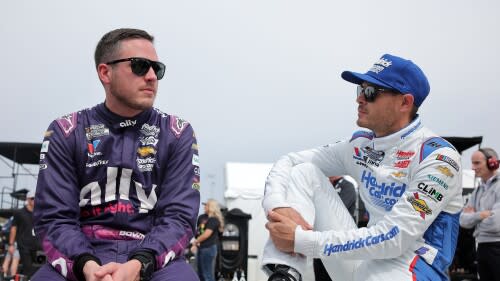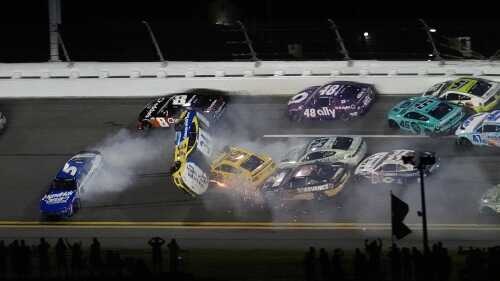Two Cup teams, including one co-owned by Michael Jordan, seek to transform NASCAR with an antitrust lawsuit against the sanctioning body and NASCAR Chairman Jim France.
Jeffrey Kessler, a specialist in sports labor and antitrust disputes representing 23XI Racing and Front Row Motorsports, said that “there has never been a case that I have found that is as egregiously anti-competitive as this one.
“Here we have a sport where one family has basically used its power to create an absolute monopoly for the benefit of that family as opposed to being for the benefit for the teams, the drivers, the sponsors, the broadcasters and the fans.”
NASCAR had no comment Wednesday when contacted by NBC Sports.
Kessler, Front Row Motorsports owner Bob Jenkins and Curtis Polk, who co-owns 23XI Racing with Jordan and Denny Hamlin, spoke to reporters Wednesday a few hours after the lawsuit was filed in U.S. District Court in Charlotte, North Carolina. The plaintiffs seek a jury trial.
23XI Racing, co-owned by Michael Jordan, Front Row Motorsports file lawsuit vs. NASCAR
23XI Racing and Front Row Motorsports were the only two Cup teams not to sign new charter agreement with NASCAR.
Jordan issued a statement Wednesday.
“Everyone knows that I have always been a fierce competitor, and that will to win is what drives me and the entire 23XI team each and every week out on the track,” Jordan stated. “I love the sport of racing and the passion of our fans, but the way NASCAR is run today is unfair to teams, drivers, sponsors, and fans. Today’s action shows I’m willing to fight for a competitive market where everyone wins.”
Two years ago, Polk said the sport’s “economic model is really broken for teams.” He noted Wednesday that nothing has changed.
“The France family has dictated every aspect of stock car racing in America, from the gas and tires we use to the parts we have to purchase for the race cars, to the schedule, rules, tracks we race, fees we have to pay to race and how our races are consumed by the public,” said Polk, whose team employs drivers Bubba Wallace and Tyler Reddick.
“This control has caused a depressing economic impact on teams’ profitability, their enterprise value, as well as driver, crew and race shop salaries. … The new charter is an attempt to further marginalize the team’s voices in the sport, surrender control of valuable intellectual property and create conflicting financial relationship with our drivers. Its goal is to consolidate the power of the France family for the benefit of themselves alone.”
NASCAR was founded by Bill France Sr. in 1948. He ran the sport until January 1972 when his son, Bill France Jr., took over leadership of NASCAR.
Bill France Jr. served as Chairman and CEO until October 2003 when his son, Brian France, moved into that role.
Brian France stepped down from that position in August 2018 after his DWI arrest and was replaced by his uncle, Jim France, who continues to oversee the sport.
The lawsuit states that Front Row Motorsports, which won the 2021 Daytona 500 with Michael McDowell, has “never generated a profit.”
Which NASCAR playoff drivers carry baggage into Talladega and who shed it in Kansas?
As NASCAR hopscotches across the country from one playoff venue to the next, the series heads to Talladega Superspeedway this weekend.
In response to a question from NBC Sports, Polk noted the differences in finances for NASCAR drivers and teams compared to others professional sports.
Polk said that in the new charter agreement, which begins next year, teams will receive “roughly over $400 million.” Polk estimated — NASCAR, a privately held organization, does not release its financial figures — that the sport “generates close to $3 billion a year. So, the teams are only sharing in the neighborhood of 13% of the overall pot that the sport is generating.”
Polk estimated that the average salary for drivers of the 36 chartered Cup teams is $3 million a year. Polk noted that the figure would be about 3% of the money he estimates NASCAR generates a year.
NFL players, who have the benefit of a collective bargaining agreement, receive 48.8% of NFL revenue in a 17-game season. NBA players receive 51% of basketball related income through its collective bargaining agreement with the league.
Kessler said NASCAR’s financial information would be available through discovery.
“That is one of the advantages of federal antitrust litigation,” he said. “We will be able to obtain financial records. We will be able to follow the money. We will be able to see exactly how exploitive this system has been and how much injury it’s inflicted on the teams and drivers.”
NASCAR makes adjustments to cars to help keep them from getting airborne
Modifications come after Michael McDowell got airborne and Josh Berry went upside down at Daytona and Corey LaJoie went upside down at Michigan.
As part of its charges of NASCAR’s monopolistic operations, the lawsuit noted the pressure teams were placed to sign the charter agreement last month.
Cup teams formed the Race Team Alliance in July 2014 to, according to the lawsuit, “jointly negotiate a fairer deal with NASCAR on behalf” of the teams. That led to the original charter agreement in 2016, which was renewed in 2021. The current charter agreement expires this year. Negotiations have taken place over the past two years.
According to the lawsuit, NASCAR stopped negotiating with the RTA in March 2024 and that NASCAR “insisted that each team separately negotiate for the renewal of its Charter Agreement” instead of a joint negotiation.
The lawsuit states that teams were given the final version of the agreement at 5 p.m. ET on Sept. 6 and told they had to sign by 6 p.m. ET or risk losing their charters. That deadline, the lawsuit states, was moved back to midnight.
Although all the Cup teams other than 23XI Racing and Front Row Motorsports signed the charter agreement last month, Kessler said that should not be viewed as an indication that the deal is good.
“In every antitrust case, the victims are taking what they can get,” Kessler said. “… But sometimes there has to be those who have the courage, the resources, the willingness to stand up and say, ‘We’re not going to take it anymore,’ and that will benefit all of them.”
In the lawsuit, 23XI Racing and Front Row Motorsports seek:
-
“A preliminary injunction that will allow them to accept and operate under the 2025 Charter Agreement until the case is resolved.
-
“Permanent injunctive relief to end NASCAR’s exclusionary practices and restore competition in the relevant market.
-
“Discovery from both NASCAR and Jim France related to their exclusionary practices and intent to insulate themselves from any competition.
-
“Trebled monetary damages for the harm suffered by Plaintiffs during the past four years as a result of having to compete under the anticompetitive, below market terms of the 2016 Charter Agreement and for the harm that Plaintiffs will suffer going forward for having to compete under the anticompetitive terms of the 2025 Charter Agreement while they litigate this case through trial.”
When asked Wednesday for further details, Kessler said he “wouldn’t articulate a specific endgame” but said, “these teams didn’t bring this case to get just modest changes made. This is not about that right now the teams have a D-plus deal and will settle for a D deal or a C-plus deal.
“What has to happen is a fundamental alteration in which any successful team can realize a fair return on their investment. Where the drivers can be fairly compensated. Where the teams control their intellectual property. Where investments can be made and realized, just like you see in all the other sports. That is a fundamental change. So I’m not gonna guess right now what exactly that’s gonna look like. We’ll find out.”
Both 23XI Racing and Front Row Motorsports plan to race next year even if they don’t have a charter. Both organizations are two-car teams. Each has an agreement to purchase a charter from Stewart-Haas Racing.
When Polk was asked if he, Jordan and Hamlin would consider exiting the sport and closing down 23XI if they don’t get the result they’re looking for, Kessler responded.
“Our clients are in this to the end,” he said. “What that is going to be depends on what the courts rule and allow, but they are going to do their best to keep competing as long as they can. We expect that to end in a legal victory or a settlement that transports this sport.”



